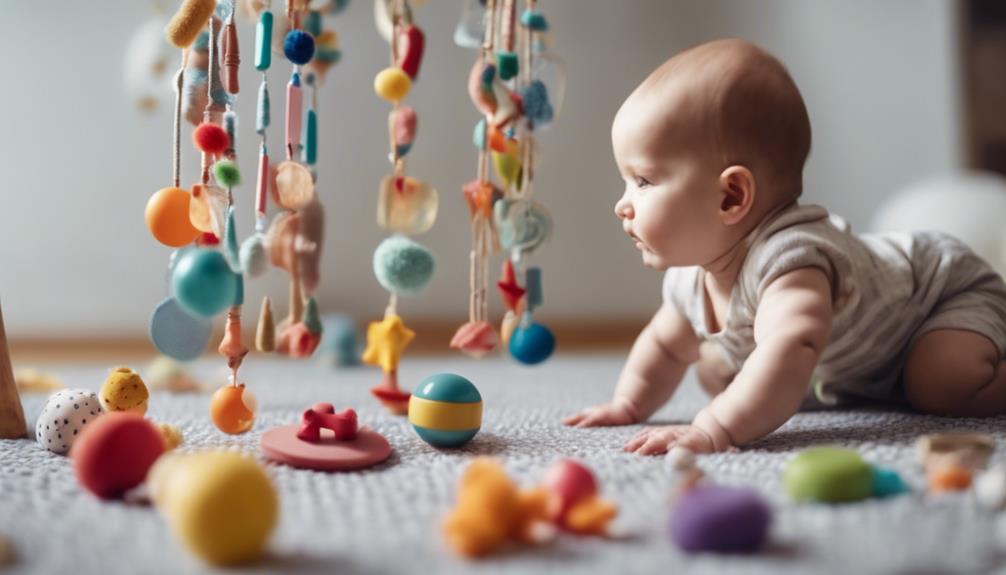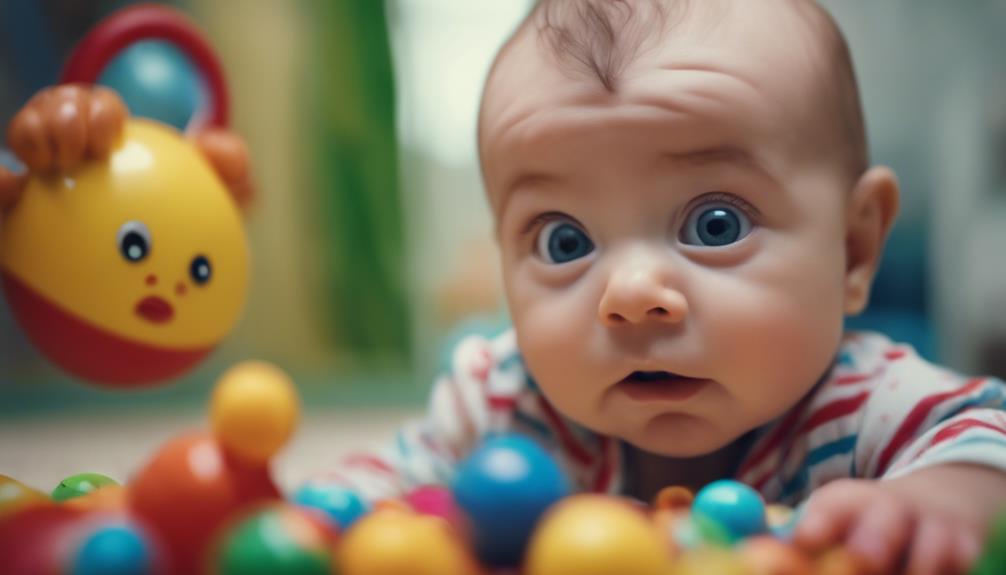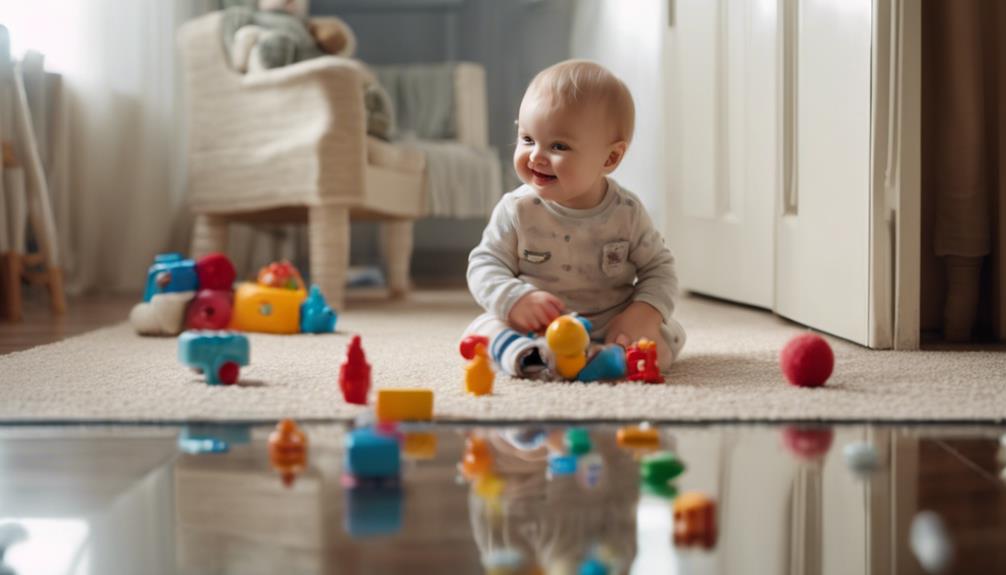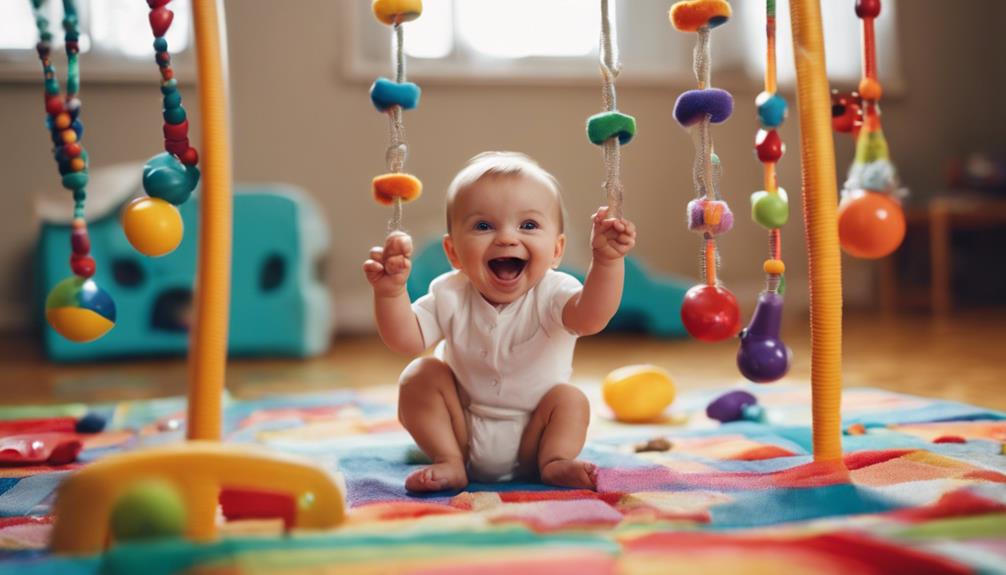To promote the development of your baby’s motor skills, consider incorporating tummy time to help strengthen their muscles. Rolling a ball can assist in boosting coordination and social skills, while utilizing various textures and toys can enhance grasping abilities. Blocks are beneficial for crawling development and muscle strength. You can also create a crawling maze to encourage coordination and exploration. Introduce finger foods to improve fine motor skills and don’t hesitate to seek advice from pediatricians. Make learning fun by engaging in activities such as tummy time, playing with balls, and building with blocks. Additionally, incorporate push and pull toys to build stamina and engage in noise-making activities to strengthen core and arm muscles. Explore these interactive methods to further support your baby’s motor skills growth.
Key Takeaways
- Implement tummy time to strengthen back and neck muscles.
- Engage in rolling a ball for coordination and arm strength.
- Offer various grasping toys to enhance hand muscles.
- Utilize blocks to promote crawling and muscle development.
- Create a crawling maze for coordination and exploration.
Benefits of Tummy Time
To enhance your baby's motor skills, prioritize incorporating tummy time into their daily routine. Tummy time is essential for developing gross motor skills in infants. By placing your baby on their stomach while awake and supervised, you help strengthen their core, back, and neck muscles. This activity not only aids in preventing flat head syndrome but also promotes a healthy head shape as your baby learns to lift and turn their head during tummy time sessions.
Regular tummy time can greatly improve your baby's motor skills and overall development. Starting this practice from birth is recommended to encourage proper muscle growth and movement. As your baby grows, you can gradually increase the duration of tummy time sessions to further enhance their physical abilities.
Remember to always supervise your baby during tummy time to guarantee their safety and comfort while reaping the benefits of this essential activity.
Importance of Rolling a Ball
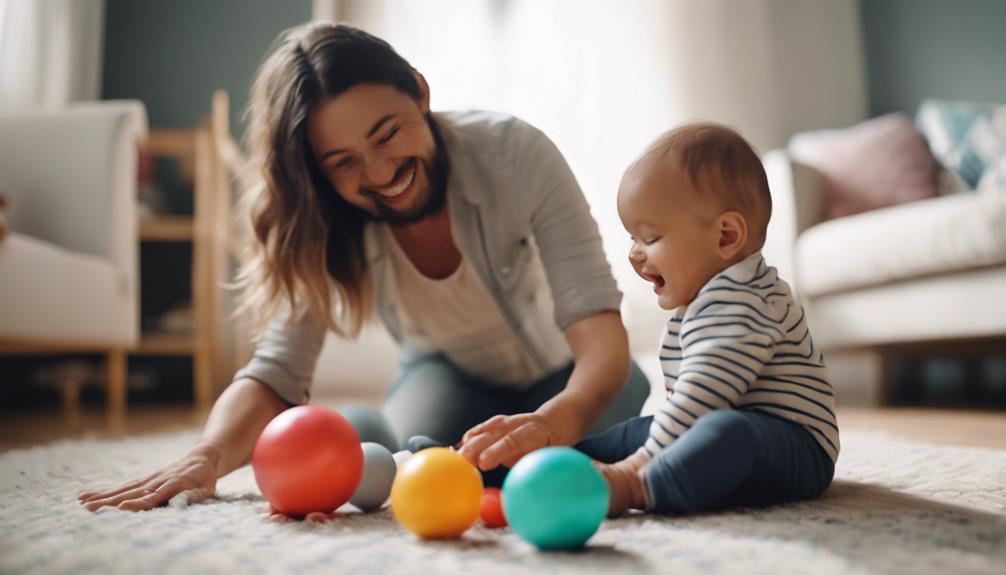
Rolling a ball with your baby is a fantastic way to improve their coordination and social skills. By engaging in this activity, you can witness firsthand how your baby's motor skills are developing.
Not only does rolling a ball encourage physical growth, but it also fosters important social interactions between you and your little one.
Rolling for Coordination
How can engaging in the simple act of rolling a ball with your baby benefit their coordination skills?
Rolling a ball aids in enhancing hand-eye coordination, promoting arm strength, and fostering gross motor skills development.
This activity encourages babies to improve their coordination and balance, all while having fun and engaging in a playful interaction.
By rolling a ball back and forth with your baby, you aren't only helping them learn cause and effect but also strengthening their muscles and enhancing their motor skills.
The repetitive motion of rolling a ball can assist in the development of essential muscles, particularly in the arms and upper body.
Moreover, this activity provides a great opportunity for babies to practice coordination by tracking the movement of the ball and learning how to control their own actions in response.
Social Interaction Benefits
Engaging in the activity of rolling a ball with your baby not only enhances their physical coordination but also fosters crucial social interaction and bonding between you both. As your baby reaches for the ball, grasps it, and rolls it back to you, they aren't only improving their gross motor development by using their arm muscles but also honing their fine motor skills and hand-eye coordination.
The back-and-forth nature of rolling a ball promotes communication as you both take turns, encouraging your baby to engage with you in a fun and interactive way.
This simple yet effective activity provides an excellent opportunity for your baby to practice reaching, grasping, and throwing, all of which contribute to their overall physical and cognitive development. By incorporating ball rolling into your playtime routine, you aren't only supporting your baby's motor skills but also fostering a strong bond through shared experiences and joyful interactions.
Enhancing Grasping Skills
To enhance your baby's grasping skills, provide a variety of toys with different shapes, sizes, and textures. Here's how you can help:
- Offering a Range of Textures: Introduce toys with smooth, rough, soft, and bumpy surfaces to stimulate your baby's sense of touch and improve their grasping ability.
- Utilizing Grasping Toys: Incorporate toys specifically designed to encourage grasping, such as rattles or textured balls, to enhance your baby's motor skills development.
- Engaging in Interactive Play: Encourage your baby to grasp and hold objects during playtime, such as blocks or stacking rings, to strengthen their hand muscles and coordination.
Utilizing Blocks for Crawling
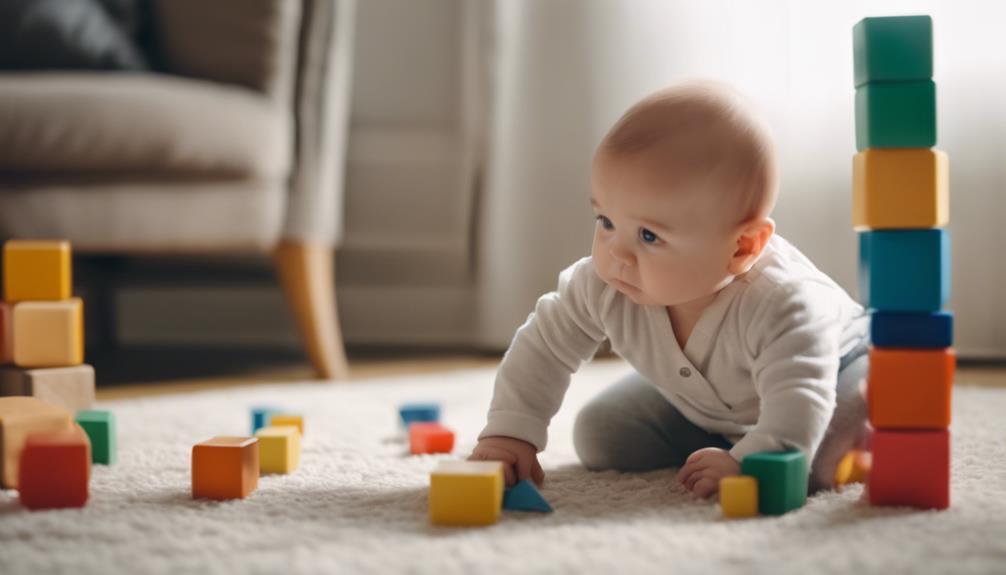
Blocks can be an effective tool for encouraging your baby's crawling development. By setting up block obstacles for your little one to crawl over and around, you can help strengthen their muscles and improve coordination.
Strategically placing blocks around the room can motivate your baby to explore and move, enhancing their gross motor skills and muscle control.
Building block towers of different shapes and sizes can also entice your baby to reach, crawl, and interact with the blocks, further promoting their motor skills development.
These crawling activities with blocks not only provide physical benefits but also stimulate your baby's curiosity and engagement with their surroundings.
Creating a Crawling Maze
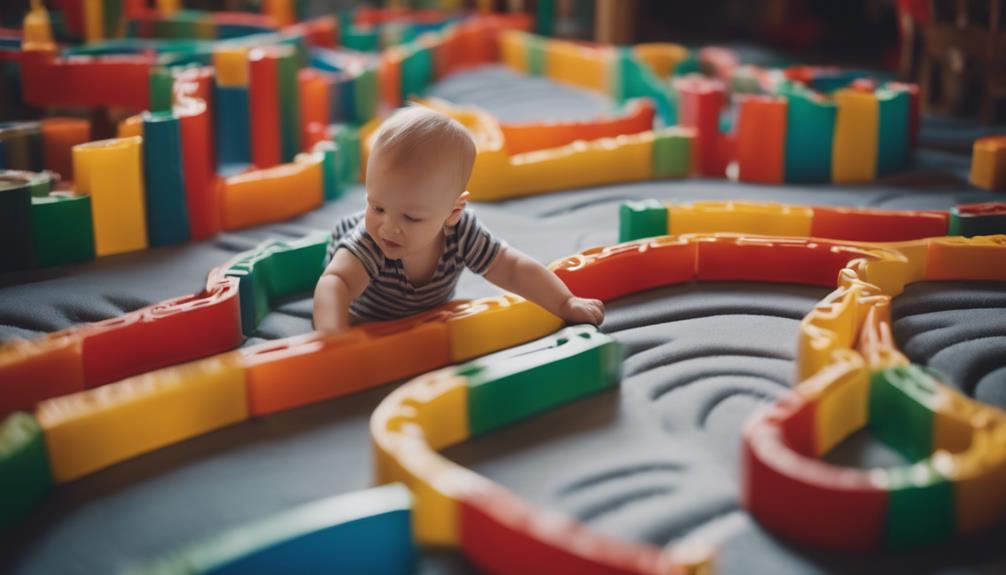
To enhance your baby's crawling skills, consider creating a crawling maze using cushions or boxes.
The maze layout design and interactive sensory elements will provide a stimulating environment for your little one to explore.
This activity promotes coordination, balance, and muscle strength development in a fun and engaging way.
Maze Layout Design
Design a crawling maze layout with various heights and textures to stimulate your baby's gross motor skills.
Here are some key elements to take into account when creating a crawling maze for your little one:
Height Variations:
Incorporate cushions or small boxes of different heights to encourage your baby to crawl up and down, helping them develop their gross motor skills.
Texture Variety:
Use materials like soft fabrics, smooth surfaces, and even some rough textures to provide sensory stimulation as your baby navigates through the maze, aiding in their motor skill development.
Obstacle Diversity:
Include tunnels for crawling through, ramps for climbing, and open spaces for exploration to keep your baby engaged and motivated to move, promoting the development of coordination and muscle strength.
Interactive Sensory Elements
Incorporating various sensory elements in a crawling maze enhances your baby's motor skills development through interactive exploration. By creating a crawling maze with cushions or boxes, you provide a stimulating environment that encourages your baby to crawl, develop spatial awareness, and enhance problem-solving skills.
As your baby navigates through the maze, they can explore different textures, shapes, and obstacles, stimulating their sensory processing and motor coordination. The interactive sensory elements in a crawling maze offer a safe and engaging way for your baby to practice movement and discover their surroundings.
This hands-on approach not only supports your baby's physical development but also fosters their cognitive abilities. Through interactive play in a crawling maze, your baby can strengthen their motor skills while having fun exploring the sensory-rich environment designed to aid in their overall development.
Finger Food for Fine Motor Skills
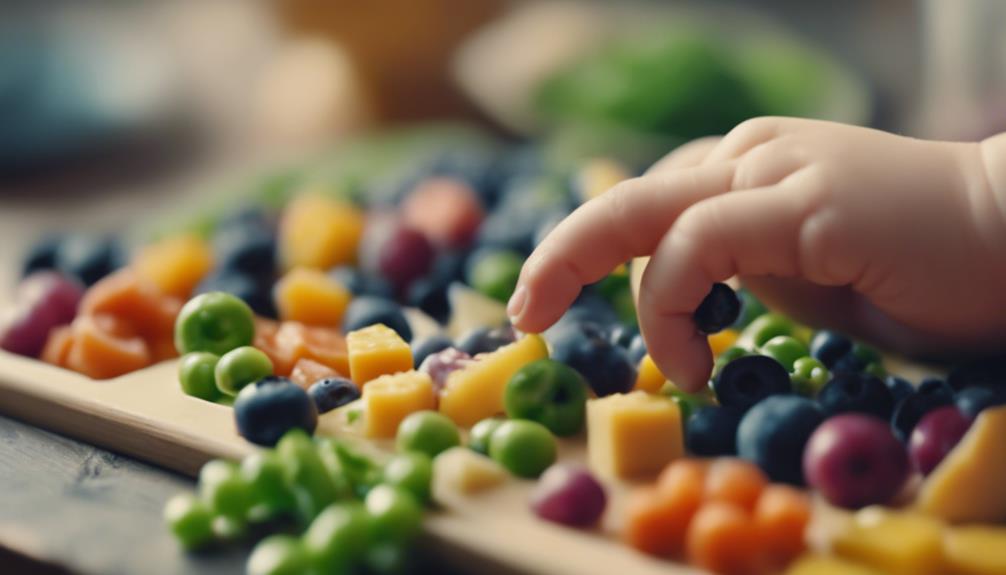
Encouraging your baby to explore and grasp finger foods can greatly enhance their fine motor skills development. When introducing finger foods to your little one, keep these tips in mind:
- Choose Soft and Bite-Sized Foods: Opt for small pieces of cereal or soft fruits that are easy for your baby to pick up and hold. These foods will challenge their fine motor skills as they practice gripping and bringing the food to their mouth.
- Provide Feeding Support: Offer guidance and assistance as your baby learns to feed themselves with finger foods. This support can help improve their coordination and dexterity, contributing to the development of their fine motor skills.
- Seek Advice from Pediatricians: Consult with your child's pediatrician for recommendations on appropriate finger foods that can promote fine motor skill development. Pediatricians can offer valuable insights tailored to your baby's age and developmental stage, ensuring a positive feeding experience that benefits their motor skills.
Providing Feeding Support and Guidance
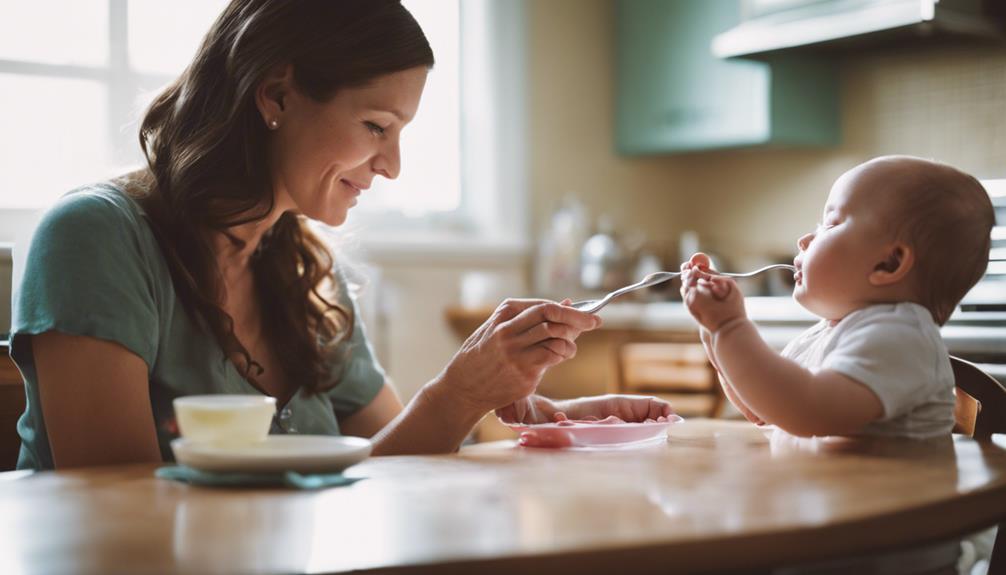
To support your baby's fine motor skills development, it's important to provide guidance and assistance during feeding experiences. By offering feeding support, you can help enhance your baby's motor skills in a nurturing and interactive manner. Here are some ways to promote motor skills through feeding:
| Feeding Support Tips | Description |
|---|---|
| Seek professional guidance | Consult with pediatricians for advice on suitable finger foods for practice. |
| Encourage self-feeding | Encourage your baby to pick up small bites of cereal or soft fruits. |
| Provide supervision | Offer support and supervision during feeding to promote skill development. |
| Utilize interactive activities | Make feeding time engaging to enhance fine motor skills. |
These practices not only aid in your baby's physical development but also create bonding moments during meal times. Remember, feeding time can be an excellent opportunity to boost your baby's fine motor skills while fostering a positive feeding experience.
Consulting Pediatricians for Food Advice
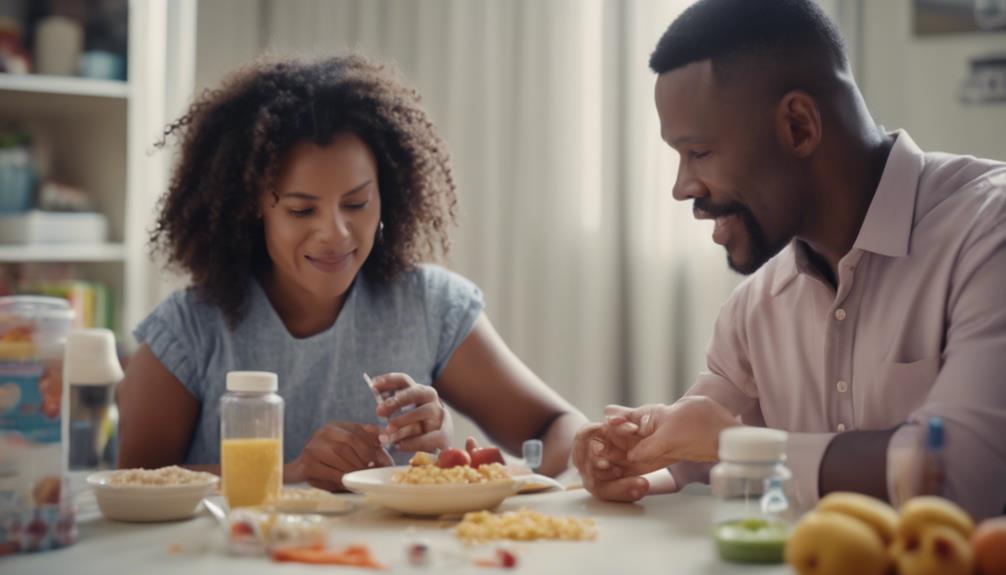
Seeking guidance from pediatricians can be beneficial in determining suitable foods to enhance your baby's fine motor skills development during feeding experiences. Pediatricians offer valuable insights on how certain foods can support your baby's motor skill development.
Here's why consulting pediatricians for food advice is important:
- Appropriate Finger Foods: Pediatricians can recommend specific finger foods that can help your baby practice grasping and picking up, enhancing their fine motor skills.
- Textures and Shapes: By consulting with pediatricians, you can learn about introducing a variety of textures and shapes of foods to encourage motor skill development in your baby.
- Feeding Experiences: Pediatricians can provide recommendations on feeding experiences that promote motor skill development, guiding you on how to make mealtime a valuable learning opportunity for your little one.
Fun and Engaging Motor Skill Activities
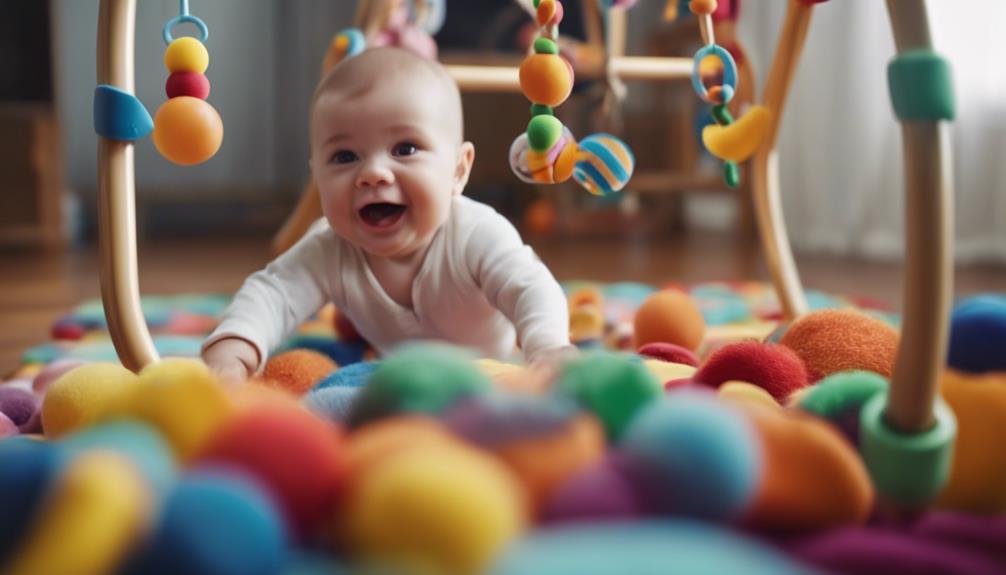
Engage in fun and engaging motor skill activities to support your baby's physical development. Start by incorporating tummy time sessions to strengthen your child's core, back, and neck muscles. Rolling a ball back and forth can help enhance their arm strength and hand-eye coordination.
Encouraging push and pull toys will build their stamina and resistance, while using baby-friendly building blocks can promote crawling and reaching skills.
To further engage your child's motor skills, consider making noise with newspapers or magazines to help build their core and upper arm strength. These activities not only support your baby's physical development but also provide them with opportunities to explore and learn through play.
Frequently Asked Questions
How to Encourage Motor Development in Babies?
To encourage motor development in babies, engage in tummy time, roll a ball back and forth, use push and pull toys, play with baby-friendly building blocks, and make noise with newspapers or magazines. These activities strengthen various muscles and skills.
When Should a Baby Start Motor Skills?
Babies typically start developing motor skills as early as 2 months old. By 6 months, they may roll over and sit up independently, showing early skills. Encouraging tummy time from birth helps strengthen core muscles for development.
What Causes Delayed Motor Skills in Infants?
Prematurity, genetic conditions, neurological disorders, and environmental factors can cause delayed motor skills in infants. Factors like low muscle tone or coordination issues contribute as well. Seeking professional evaluation and early intervention are essential for addressing delays.
What Influences Motor Development in Infants?
Your baby's motor development is influenced by genetics, environment, and opportunities for movement. Providing a stimulating environment aids their growth. Milestones like tummy time, reaching for objects, and crawling support skill development. Interacting and playing with caregivers enhances progression.
Conclusion
So, go ahead and kickstart your baby's motor skills development journey with these fun and engaging activities.
Just like planting seeds in a garden, nurturing these skills will help them grow and blossom into strong and capable individuals.
Remember, every little step counts towards their growth and development, so keep exploring different ways to encourage and support their motor skills.
Your baby's journey to mastering these skills starts now!

